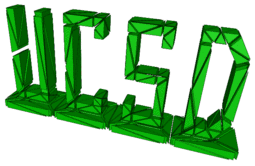| Michael Holst | ||
| https://ccom.ucsd.edu/~mholst/ |
Distinguished Professor of Mathematics and Physics UC San Diego |
|
|
Math 170B (Introduction to Numerical Analysis: Approximation and Nonlinear Equations)
Course Topics: Numerical methods for solving nonlinear equations and for approximation Instructor: Prof. Michael Holst (5739 AP&M, mholst@math.ucsd.edu; Normal Office Hours: Mon 2-4pm; Finals: Tue (6/12/12) 1-3pm) Term: Spring 2012 Lecture: 12:00p-12:50p MWF, AP&M B412 TA: Shi (Fox) Cheng (5760 AP&M, scheng@math.ucsd.edu; Office Hours: 3:30p-4:30p Tu-Fri) Discussion: 5:00p-5:50p, B412 AP&M Main Class Webpage: http://ccom.ucsd.edu/~mholst/teaching/ucsd/170b_s12/index.html Textbook(s): D. Kincaid and W. Cheney, Numerical Analysis: Mathematics of Scientific Computing, Third Edition. Printable Syllabus: Can be found [ here ]. CATALOG DESCRIPTION: 170B. Introduction to Numerical Analysis: Approximation and Nonlinear Equations (4) Rounding and discretization errors. Calculation of roots of polynomials and nonlinear equations. Interpolation. Approximation of functions. Three lectures, one recitation. Knowledge of programming recommended. Prerequisites: Math 170A. COURSE INFORMATION: Many of the advances of modern science have been made possible only through the sophisticated use of computer modeling. The mathematical foundation of the computer modeling techniques now used in all areas of mathematics, engineering, and science is known as numerical analysis. The Math 170ABC series at UCSD provides an introduction to the exciting field of numerical analysis, which is also sometimes referred to as computational mathematics or scientific computing. Professor Holst has a passion for this particular area of mathematics, and much of his published research is in this area, and in particular in the topics covered in 170B. Math 170B deals primarily with the development and analysis of algorithms (or, numerical methods) for solving systems of nonlinear equations, and for doing approximation (of data, functions, or even solutions to differential or integral equations). GRADES, HOMEWORKS, EXAMS, AND IMPORTANT DATES: Course information, such as homework assignments, due dates, and exam dates, will be maintained on the class webpage. Note that I sometimes make minor changes to the homework assignments as the quarter progresses, based on how much I am able to cover in the lectures. Therefore, CHECK THE WEBPAGE FREQUENTLY. The course will be graded on the homework assignments, two midterm examinations and a final examination, according to the following guidelines:
Here are some other important dates:
There will be five homework assignments throughout the quarter. The first midterm will be based on homeworks 1 and 2. The second midterm will be based on homeworks 3 and 4. The final will be cummulative and based on homeworks 1-4, as well as a small amount of new material from homework 5. The following policies regarding homeworks and exams will be applied:
LECTURES: The lectures will follow the textbook quite closely. Homework assignments will be a combination of theoretical and computer problems; this will require some computer programming using MATLAB. The TA will be able to assist you in accessing your computer accounts as well as MATLAB.
|
